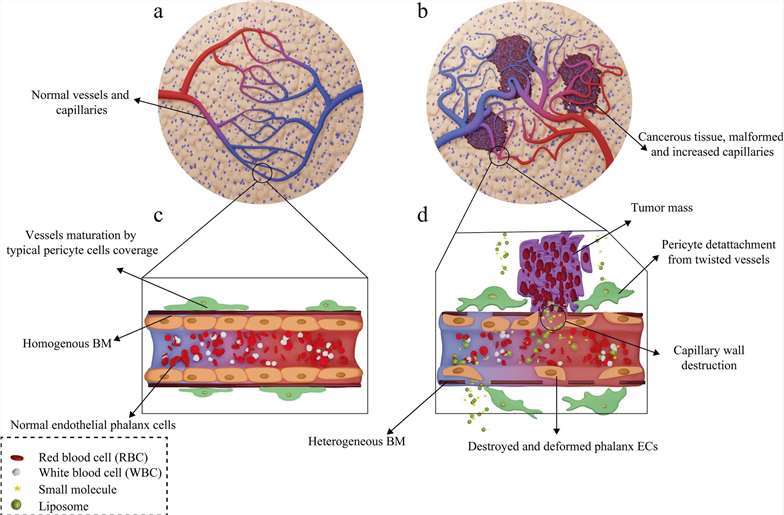Liposome Delivery System Development for Tumor-Targeted Therapeutic Research
Inquiry
Liposomal delivery is increasingly recognized for its versatile applications across pharmaceuticals, cosmetics, and biological membranes. Serving as efficient carriers, liposomes can encapsulate a wide range of drugs, offering potential therapeutic benefits. CD Formulation combines extensive expertise and years of experience to deliver custom solutions for targeted tumor therapeutic research, utilizing cutting-edge liposome technologies.
About Liposome Delivery Systems for Tumor-Targeted Therapy
Liposomes are ideal drug carriers due to their ability to encapsulate both hydrophilic and lipophilic drugs, along with their biocompatibility and biodegradability. Technological advancements, including remote drug loading, triggered release, ligand-targeting, and combination liposomes, have made them a primary tool for cancer treatment. The enhanced permeability and retention (EPR) effect allows liposomes to accumulate in tumor tissues, especially solid tumors. This feature, combined with the pathophysiological conditions of tumor tissues (e.g., vascular leakage), makes liposome encapsulation a valuable anti-cancer strategy.
However, conventional liposomes may fuse or aggregate, resulting in incomplete drug release, and the variability of the EPR effect can complicate their performance across different tissues. To overcome these challenges, advanced approaches like stimulus-responsive and actively targeted liposome systems have gained prominence.
 Fig.1 Tumor targeted drug delivery mechanism. (Kaushik, Neha, et al, 2020)
Fig.1 Tumor targeted drug delivery mechanism. (Kaushik, Neha, et al, 2020)
Our Liposome Delivery System Development Services
At present, the liposome delivery systems available for cancer treatment primarily encompass the following types:
Functionalized peptides have the potential to augment the efficacy of liposome-mediated drug delivery in cancer therapy by promoting specific drug targeting, enhancing drug penetration, and facilitating directed accumulation at the site of action, thereby amplifying therapeutic effectiveness.
In addition to nanoparticles, antibody-drug conjugates (ADCs) represent the most commonly utilized active targeted drug delivery system. Furthermore, antibody-mediated liposomes combine nanodelivery systems and antibodies to enhance the targeting of cancer treatment.
Due to the high expression of folate receptors in a wide range of human cancer cells, including ovarian, lung, breast, endometrial, renal, colorectal cancers and myeloid leukemia, this approach can be utilized for targeted delivery of diverse imaging and therapeutic agents to tumor tissue.
It is widely recognized that the expression of transferrin receptor (TfR) in tumor cells is significantly elevated compared to normal cells, rendering TfR an appealing target for cancer therapy.
ADCs are attracting attention due to their high specificity for particular ligands, chemical adaptability, and tissue penetration capability. They have been successfully utilized in diverse treatments, encompassing toxins, peptides, chemotherapeutic drugs, and oligonucleotides. Consequently, antibody-mediated drug delivery has emerged as a crucial tool for the safe and effective treatment of various human diseases such as cancer, neurological disorders, and immune system abnormalities.
Due to the presence of the endothelium as a biological barrier, liposomes are constrained in their ability to passively penetrate the affected area. Consequently, the development of nanoparticles with intrinsic characteristics similar to circulating cells (such as white blood cells and platelets) as a biosynthetic drug delivery system has emerged as a strategy for overcoming traditional DDS limitations.
Our Capabilities for Liposome Delivery System Development
| Techniques & Platforms |
Details |
| Liposome Delivery System Development Platform |
- Suitable for researching the delivery of various small molecule drugs, antibody-based therapies, and gene therapies.
- Capable of facilitating research into treatments for various cancers, including ovarian, lung, breast, endometrial, kidney, colorectal cancers, and myeloid leukemia.
|
| Characterization Platform |
- Ensures quality control to maintain safety and stability.
- Comprehensive analysis of proprietary liposome delivery systems, including morphology, size distribution, stability, drug loading, release kinetics, and targeting efficiency.
|
Why Partner with CD Formulation?
- Expertise in Custom Liposome Formulations: Our team has robust capabilities in designing and optimizing liposome drug delivery systems. We tailor formulations to address the specific properties of each research objective, ensuring stability, solubility, and controlled release through rigorous testing and animal model validation.
- Comprehensive Pre-Clinical Evaluation: We employ advanced technologies to conduct detailed evaluations of liposome-based therapies, including bio-distribution, metabolism, and toxicity, providing essential data to support preclinical trials.
With extensive experience and a commitment to innovation, CD Formulation is your reliable partner for developing effective liposome-based anti-cancer therapies. Contact us to learn how we can support your project.
References
- Rommasi, F., Esfandiari, N. Liposomal Nanomedicine: Applications for Drug Delivery in Cancer Therapy. Nanoscale Res Lett. 2021, 16, 95.
How It Works
STEP 2
We'll email you to provide your quote and confirm order details if applicable.
STEP 3
Execute the project with real-time communication, and deliver the final report promptly.
Related Services

 Fig.1 Tumor targeted drug delivery mechanism. (Kaushik, Neha, et al, 2020)
Fig.1 Tumor targeted drug delivery mechanism. (Kaushik, Neha, et al, 2020) 
